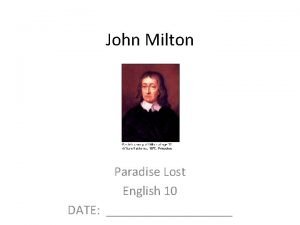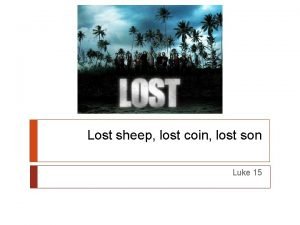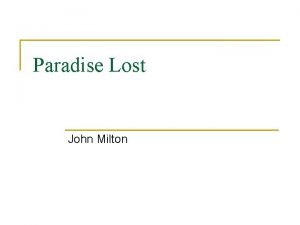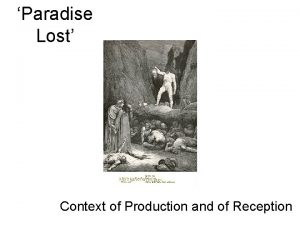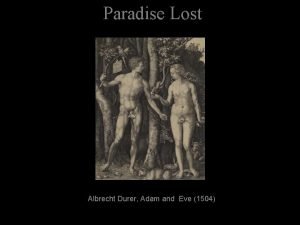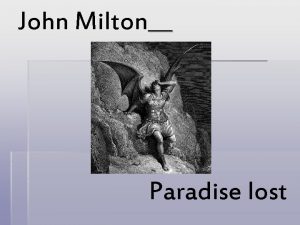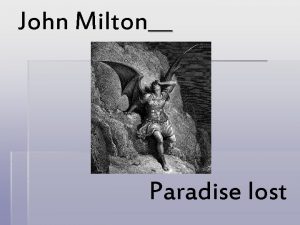John Milton Paradise Lost English 10 DATE 17









- Slides: 9

John Milton Paradise Lost English 10 DATE: __________

17 th Century Poetry: John Milton • • In literature and poetry at the time, there was heightened focus on and analysis of the self and the personal life. John Milton lived from 1608 -1674. Milton was interested in producing poetry dealing with religious themes. He became progressively blind but completed Paradise Lost in 1667, which chronicles Satan’s temptation of Adam and Eve and their expulsion from Eden. It is an epic poem (like Beowulf) and widely regarded as Milton’s masterpiece. REVIEW: An epic poem is a long, narrative poem that celebrates a hero’s deeds Traits of an epic: - Celebrate hero’s deeds; - Hero is usually of noble birth; - Hero’s character traits usually reflect the important ideals of society; - Hero performs courageous deeds that reflect society’s values; - Hero’s actions often determine the fate of a nation/people; - Vast setting (more than one country); - Poet uses formal language, serious tone; - Major characters often give speeches; - Plot is complicated by supernatural beings or a dangerous journey through foreign countries; - Poem talks about universal themes, like good vs. evil. There allusions to people, places and events in the Bible and ancient mythology in Paradise Lost.

• Milton wrote Paradise Lost to justify the ways of God to men. • It is comprised of rhythmic blank verse (poetry written in iambic pentameter and unrhymed). • Probes the relationships between: a. free will and destiny; b. freedom and responsibility; c. facing life’s limitations. • There archaic words in the poem (i. e. thee, thy and thine mean you, your and yours). • Milton uses long, sweeping sentences. • Milton employs unusual word order, too.

• Paradise Lost summary: A heavenly angel, Satan, leads a rebellion because he resents God’s appointment of His son to the position of greatest power in Heaven. When the rebellion is defeated and the angels are cast into Hell, Satan vows to corrupt humanity. He sets up his own underworld kingdom with its palace called Pandemonium and tempts the first woman, Eve, to eat the fruit of the Tree of Knowledge in the Garden of Eden. Adam and Eve experience God’s mercy and wrath but they have hope for the future. They have been exiled from the garden but God has promised a savior. • We will read the opening of book one. There are twelve books in Paradise Lost. • What do we already know about the story of Adam and Eve in the Garden of Eden?

Lines 1 -26 • • Milton calls upon a Muse to narrate his story, like ancient epics did, asking her to tell us the story of man’s first disobedience against God (eating the fruit of the Tree of Knowledge), his banishment from Eden, and the promise that Jesus Christ will restore man (lines 1 -6). Line 4: One greater Man refers to Jesus Christ. Lines 6 -10: Heavenly Muse refers to the Spirit of God. Milton refers to the muse as inspiring Moses, the shepherd who taught the chosen seed (the Jews) about creation. Line 7: Oreb or Sinai refer to the mountain upon which Moses heard the Lord’s voice in the Bible. Lines 13 -26: Milton says that his poem, like his muse, will fly above those of the Classical poets and accomplish things never attempted before, because his source of inspiration is greater than theirs. Then he asks the Holy Spirit to fill him with knowledge of the beginning of the world, because the Holy Spirit was the active force in creating the universe. Line 24: argument means subject. Line 26: Milton says he will assert eternal Providence and justify the ways of God to men. – Providence: God’s plan for the universe. • • Milton assumes that he is capable of understanding God’s thoughts and actions when he states that he will justify the ways of God to men. Why has Satan fallen to Hell? Because he led an uprising in Heaven.

Lines 27 -49 • • • • Lines 27 -33: Milton asks what caused our grandparents (Adam and Eve) to disobey their creator when they were in favor and who seduced them to disobey? Line 31: transgress means to overstep the limit set. Line 32: for means on account of; besides means otherwise. Lines 34 -37: Milton answers that it was “th’ infernal serpent” who seduced the mother of mankind (Eve) and that he did it because he was envious and wanted revenge because he had been cast out of Heaven. The Bible refers to Satan as “that old serpent” in Revelation 20: 2. Line 36: what time means when. Lines 38 -49: Satan led a rebellion against God in Heaven and was cast out, along with his fellow rebel angels, to perdition, where he was to dwell in chains and fire because of his defiance. Line 43: impious means showing disrespect for God. Lines 34 -44 introduce Satan. What is our impression of him? He is serpent-like, envious, revengeful, deceitful, proud, ambitious and rebellious. He views God as competition, not an entity to be obeyed. Line 45: ‘th ethereal sky means Heaven. Line 47: perdition means damnation. Line 48: adamantine means indestructible. Lines 44 -49: What has happened to Satan because he led the uprising? God threw him out of Heaven into Hell. Milton refers to God in four different ways throughout lines 40 -49: – The Most High (line 40); – God (line 42); – The Almighty Power (line 44); – The Omnipotent (line 49).

Lines 50 -74 • • Lines 50 -53: For a period nine times day and night (24 hours) Satan and his rebel angels rolled in the fiery gulf. They were confuse despite being immortal. Lines 53 -58: Satan becomes more angry because of his fate, as there is more punishment in store for him. He thinks of lost happiness and lasting pain. He is proud and hateful, not repentant. Line 58: obdurate means stubborn. Lines 59 -69 describe Hell. It is a horrible dungeon, a great furnace, whose flames give no light. It’s purpose is to show sights of woe and sorrow, and one cannot rest and find peace there. – Milton uses a paradox (a situation, person or thing combines contradictory features or qualities) when describing flames that have no light. Lines 70 -74: Milton refers to God as Eternal Justice and says that he prepared their prison of utter darkness as far away from God and Heaven’s light as the center of Earth is from the heavens. This is a reference to Virgil’s Aeneid (a Latin epic poem). Line 75: Milton says Hell is very unlike Heaven. What might Heaven be like then? Full of light, hope, peace and joy. Lines 76 -81: Satan realizes that he has a companion, Beelzebub, with him. Line 78: weltering means writhing or thrashing about.

Lines 75 - 124 • • Line 81: Beelzebub is a powerful demon, called the “prince of the devils” in Matthew 12: 24 of the Bible. Line 81: “th’ arch-enemy” refers to Satan, whose name comes from the Hebrew word meaning adversary or enemy. Lines 81 -124: Satan speaks to Beelzebub, remarking upon how much Beelzebub has changed from the happy, bright, shining angel he was (lines 84 -87). Satan remarks that misery has joined them in equal ruin (lines 90 -91). They now have been cast into a pit and did not realize before how strong God was (lines 92 -94) or how powerful He would be when angry (lines 94 -95). Lines 94 -99: Satan refuses to change his intention to defy God, saying that, although he is changed in outward appearance (“outward luster”), he does not repent or change that fixed mind and high disdain he had from the sense that he was deserving of more and was injured by God when he did not receive it. Lines 105 -108: Satan says that he has not given up. He still has unconquerable will, seeks revenge, has immortal hate, and has courage never to submit to God. Line 107: study means pursuit. Lines 110 -112: Satan says that God’s wrath or might will never take those things away from him and that he will not kneel to God under the shame of the downfall. – Line 112: Suppliant knee means kneeling in a begging posture.

• Lines 111 -124: Satan addresses his comrades and acknowledges their shame in falling to the heavenly forces (lines 115 -116), but urges them to gather in order to consider whether another war is feasible (lines 118 -124). • Line 114: doubted means feared for. • Line 115: ignominy means disgrace. • Line 117: this empyreal substance means the heavenly material of which the angels’ bodies are made.



